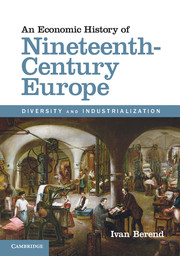Book contents
- Frontmatter
- Contents
- List of boxes
- List of figures
- List of maps
- List of tables
- Preface
- Introduction
- Part I Gradual revolution
- Part II Successful industrial transformation of the West
- Part III The peripheries: semi-success or failure of modern transformation
- Chapter 9 The “sleeping” peripheries, traditional institutions, and values
- Chapter 10 The Western sparks that ignite modernization
- Chapter 11 Advantage from dependence: Central Europe, the Baltic area, Finland, and Ireland
- Chapter 12 Profiting from foreign interests: the Mediterranean and Russia
- Chapter 13 The predator Leviathan in peasant societies: the Balkans and the borderlands of Austria-Hungary
- Chapter 14 Epilogue: economic disparity and alternative postwar economic regimes
- References
- Index
- References
Chapter 9 - The “sleeping” peripheries, traditional institutions, and values
from Part III - The peripheries: semi-success or failure of modern transformation
Published online by Cambridge University Press: 05 December 2012
- Frontmatter
- Contents
- List of boxes
- List of figures
- List of maps
- List of tables
- Preface
- Introduction
- Part I Gradual revolution
- Part II Successful industrial transformation of the West
- Part III The peripheries: semi-success or failure of modern transformation
- Chapter 9 The “sleeping” peripheries, traditional institutions, and values
- Chapter 10 The Western sparks that ignite modernization
- Chapter 11 Advantage from dependence: Central Europe, the Baltic area, Finland, and Ireland
- Chapter 12 Profiting from foreign interests: the Mediterranean and Russia
- Chapter 13 The predator Leviathan in peasant societies: the Balkans and the borderlands of Austria-Hungary
- Chapter 14 Epilogue: economic disparity and alternative postwar economic regimes
- References
- Index
- References
Summary
Time stands still
This was the impression of British travelers who sought to “discover” the exotic world of the European peripheries, a couple of thousand kilometers away from London. In the middle of the British Industrial Revolution, Edward Daniel Clark traveled to Russia and described it as a country frozen in “Asiatic barbarity” (Dolan, 2000). John Paget went to Hungary roughly forty years later and published a thorough and thoughtful description of the country in 1839. He was startled by the “laziness” he experienced: “A Magyar never moves when he can sit still.” “Among many of the nobles,” he also noted, “there is so great ignorance and so strong prejudice…against losing what they consider their rights, and…against raising the peasantry to think and feel like men” (Paget, 1839, 19, 21).
“Laziness” was an impression received by visitors in the Balkans even thirty years later. “Foreign visitors called it laziness…intellectuals sidestepped the issue by referring to the ‘pre-capitalistic’ attitudes of the Balkan peasantry” (Palairet, 1997, 311). Two British women traveled throughout the Balkans in the 1860s and 1870s and reported on Bosnia-Herzegovina's
fragment of [a] modern railway, lying detached and unconnected…[which] run[s] once a day each way, conveying a ludicrously small average of goods and passengers…Plums remained the province's most valuable product, and only one man in a hundred could read…[In Pristina they asked a girl in a school] what is it that you learn?…[Her answer was] to say our prayers…Can you understand these prayers? No…That is all that we can teach them [explained the teacher], for it is all we know ourselves.
(Mackenzie and Irby, 1877, 1, 3, 91, 279, 404)- Type
- Chapter
- Information
- An Economic History of Nineteenth-Century EuropeDiversity and Industrialization, pp. 317 - 353Publisher: Cambridge University PressPrint publication year: 2012



